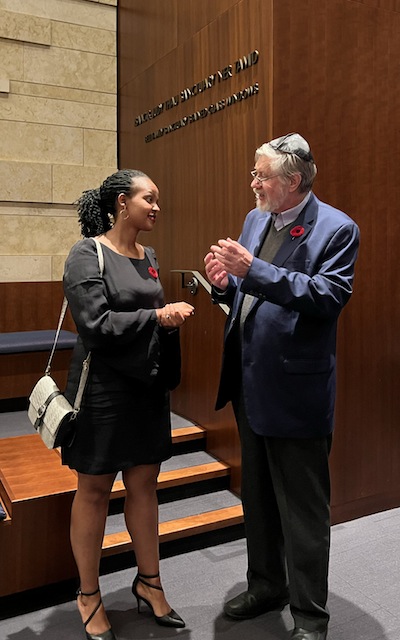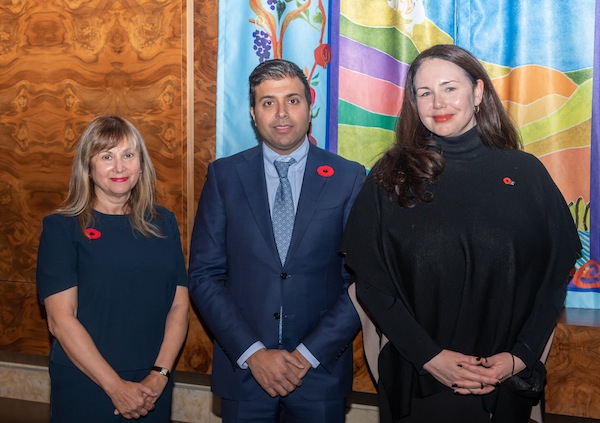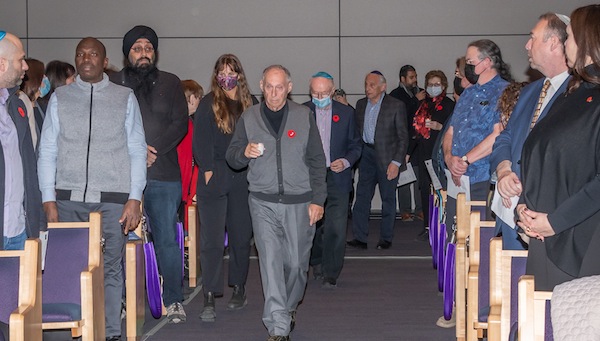Holocaust survivors participate in the candlelighting ceremony at the community’s Kristallnacht commemoration Nov. 9. (photo by Al Szajman)
Commemorating the Holocaust and the sad succession of genocides that have been perpetrated since is a sacred responsibility – but it is not enough, says Liliane Pari Umuhoza. That memory must be the motivation that drives people to make a better world, she said.
Umuhoza was 2 years old when her father and a million others were murdered during the Genocide Against the Tutsis of Rwanda, in 1994. After experiencing trauma in her adolescence due to that familial and communal history, Umuhoza has devoted her life to commemorating and educating about the genocide and encouraging people to dedicate themselves to healing their societies.
“When we remember, we help ensure that the memories and legacies of the victims and survivors continue to resonate for future generations,” she said at Vancouver’s community Kristallnacht commemoration Nov. 9. “When we remember, we learn about the history and create awareness. But that’s not enough. What matters the most is how we use that history to create a better world.”
The annual event took place at Beth Israel synagogue on the 84th anniversary of Kristallnacht, the “Night of Broken Glass,” on Nov. 9-10, 1938, which is the moment when anti-Jewish regulations and systemic discrimination turned into overt violence and murder. It is seen by many historians as the effective beginning of the Holocaust.
The event was presented by the Vancouver Holocaust Education Centre (VHEC), in partnership with Congregation Beth Israel and with support from the Robert and Marilyn Krell Endowment Fund of the VHEC and from the Jewish Federation of Greater Vancouver annual campaign.
Umuhoza arrived in Vancouver several months ago to attend the University of British Columbia, where she is pursuing a master’s degree in public policy and global affairs. She is founder of the Women Genocide Survivors Retreat and is project officer for Foundation Rwanda, which provides funding for education to those who were born from rape during the genocide.
She began by outlining her own family’s history.
“I was 2 years old in the genocide of the Tutsis in Rwanda,” she said. “During this tragedy, my father was killed. Some of my uncles, aunties, cousins and many other members of my extended family are among the million Tutsi who were killed by the Hutu extremists in 100 days.
“One million people were killed in 100 days,” she stressed. “I was lucky to survive with my mother, who managed to escape to a neighbouring country, Congo, holding me, a 2-year-old baby, where we lived as refugees until it was safe enough for us to go back to Rwanda.”
She considers herself fortunate in comparison with many of her peers.
“I now have a stepfather and stepsiblings and I cannot tell you how blessed I feel because most of my friends from home grew up without a father or a mother figure in their lives,” she said.
Umuhoza was too young to understand what was happening at the time, she said. “But I grew up facing the consequences of that tragedy in every corner of my life. As many of you may know, psychologically, young children between the age of 0 and 5 are the most vulnerable to the effects of trauma since their brains are in the early development stage. For most people who have been exposed to genocide or war as children, the trauma can become severe at the adolescent stage and adulthood, if it is not properly treated.”
At the age of 12, Umuhoza began to exhibit symptoms of trauma, including depression, post-traumatic stress, nightmares, frustration, anger and confusion. She used the strength of others as an example to recover, including a friend who had to take on the parent role from childhood after she and her younger siblings were orphaned. Umuhoza is now deeply immersed in often deeply difficult aspects of education, such as translating the narratives of other survivors through Foundation Rwanda.
“My role with this organization was to listen to the stories of these women in their Rwandan mother language and translate the stories in English so we could use those stories to create awareness and educate the world about the genocide and its ongoing consequences,” she said. “I found myself in a series of stories I’d never heard before … stories of mass murder, stories of pain, stories of rape.”
One of the lessons she learned from the genocide is to never tolerate injustice, no matter how big or small, Umuhoza said.
“Speak up and raise your voice when you see or hear people denying that the Holocaust happened,” she said. “Speak up when you hear people saying that the genocide did not happen. Speak up when you see minorities being unfairly treated. Speak up when you see women in Tehran being oppressed. Let’s dare to step out of our common comfort zone and cultivate empathy to people around us.”
She concluded: “Individually, we can change our communities. But together we can change the world.”

Earlier in the evening, Prof. Chris Friedrichs contextualized the history of the Holocaust, emphasizing the importance of synagogues as a place of refuge for Jewish communities. The Kristallnacht commemoration has been taking place in the sanctuary of Beth Israel for more than 40 years, he said.
There were more than 1,000 synagogues in Germany at the time of Kristallnacht, he noted, some many centuries old, while others were newer, having been dedicated in the presence of senior German officials, clergy and others, a testament to the apparent solidity of the Jewish community’s place in the country.
“But then, beginning in 1933, everything started to change,” said Friedrichs, professor emeritus of history at UBC. “Once the Nazis came to power, Germans were taught to shun their Jewish neighbours. Jews were banned from public places. They could no longer go to the theatre or walk in the park or send their children to public schools. But one place was still open to them – their own synagogues, where they could gather to worship or study or simply spend time with their fellow Jews. And so it was until Nov. 9, 1938, when, in one carefully orchestrated nationwide night of terror, hundreds of synagogues all over Germany were set aflame, thousands of Jews were arrested, over 100 were killed. The next morning, Jews found their synagogues turned into empty shells and the windows of their shops shattered into broken shards of glass and the contents plundered. No Jew in Germany ever forgot that night of broken glass, Kristallnacht.”
Irwin Cotler, Canada’s special envoy on preserving Holocaust remembrance and combatting antisemitism, spoke via video link to the audience.
Of the Holocaust, he said, “It was a continuation and manifestation of history’s oldest, longest, most enduring and most toxic of hatreds, antisemitism, a hatred that mutates and metastasizes over time, which is grounded in one generic, historical, foundational, conspiratorial trope of the Jews – the Jewish people, the Jewish state – as the enemy of all that is good and the embodiment of all that is evil, which led, therefore, to the demonization and dehumanization of the Jew as prologue and justification for Kristallnacht and the Holocaust.”
A parallel between the Holocaust and the genocide against the Tutsis, he said, is that they were preventable.
“Nobody could say we did not know,” said Cotler. “We knew, but we did not act.”
Corinne Zimmerman, president of the VHEC, opened the event. Nina Kreiger, executive director, introduced the speakers and acknowledged dignitaries in attendance.
Beth Israel’s Rabbi Jonathan Infeld, a child of Holocaust survivors, thanked Umuhoza and reflected on her words and those of other speakers. He understands the idea of trauma being passed down through generations, he said. Reflecting on Friedrichs’ discussion of the centrality of the synagogue in Jewish life, Infeld said his spiritual leadership of the congregation during the construction of the new synagogue building was a form of response to the history of his family and the Jewish people.
Elected officials also spoke at the ceremony. Taleeb Noormohamad, member of Parliament for Vancouver Granville, spoke of his first trip to Berlin, where he walked around the streets of the old Jewish district.
“As somebody who had never really seen firsthand until that trip the horrors of what had happened to the Jewish community and to so many others,” said Noormohamad, “in that moment you come to realize the absolute inexplicable horror that was cast upon people and what it does to people, to communities, to families and to the histories of people.”
He committed to standing with the Jewish community against discrimination and noted the diversity of the audience, which included himself, a Muslim Canadian; Michael Lee, a Chinese-Canadian member of the legislature; and Ken Sim, a Chinese-Canadian mayor.
Parm Bains, member of Parliament for Steveston-Richmond East, was also present, as was Marc Eichhorn, consul general of Germany in Vancouver.
“Antisemitism is not a problem, a fight, that is for the Jewish community alone,” Noormohamad said. “When you look in this room today, we are all in this together. This is our community. You are our family and the remembrance of what happened is our responsibility as much as it is yours.”

The Kristallnacht commemoration was the first official community event for Sim, who was sworn in as mayor of Vancouver three days before. He, too, spoke of visiting Germany, along with his wife and their four sons, where they witnessed the Memorial to the Murdered Jews of Europe and pondered the Stolpersteine, the “stumbling stones” that have been installed to mark the places where victims of Nazi extermination or persecution lived. The family, he said, has also visited Auschwitz, in Poland, and the United States Holocaust Memorial Museum, in Washington, D.C.
During the recent election campaign, Sim promised that, as mayor, he would promote the adoption of the International Holocaust Remembrance Alliance Working Definition of Antisemitism, which the previous council failed to do. He repeated his commitment at the ceremony, and council passed the motion on Nov. 16. (Click here and here for stories.)
Sim was joined at the event by Vancouver Councilor Sarah Kirby-Yung, who Sim credited as a stalwart ally of the Jewish community. Together, they read the official proclamation from the City of Vancouver.
“Out of the shards of destruction, in this case the glass on the night of Kristallnacht, often are born the glimmers of hope,” said Kirby-Yung, “and I think that is what keeps all of us going. It is the resilience and faith and the hope of the Jewish community that I think embodies the spirit of what we aspire to deliver here in the city of Vancouver.”

